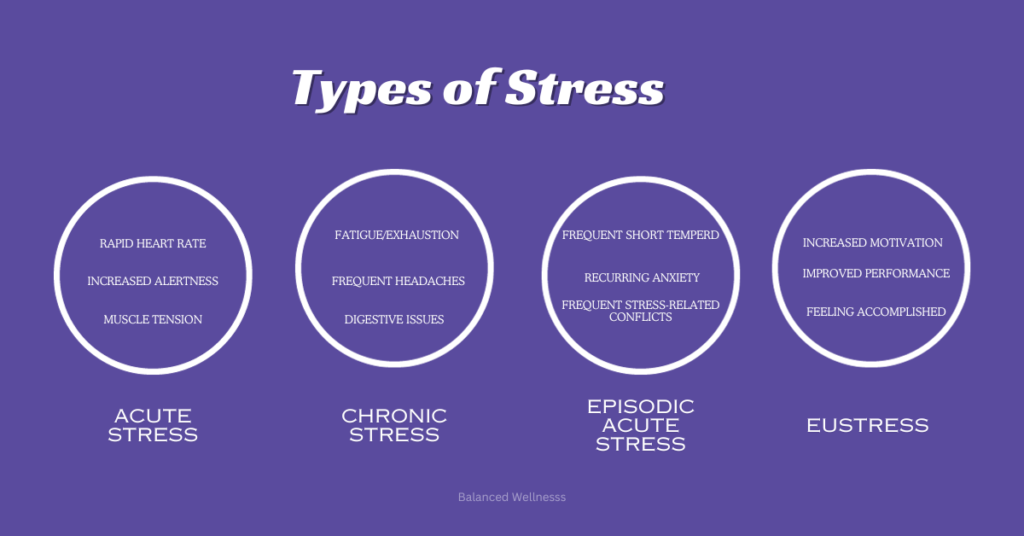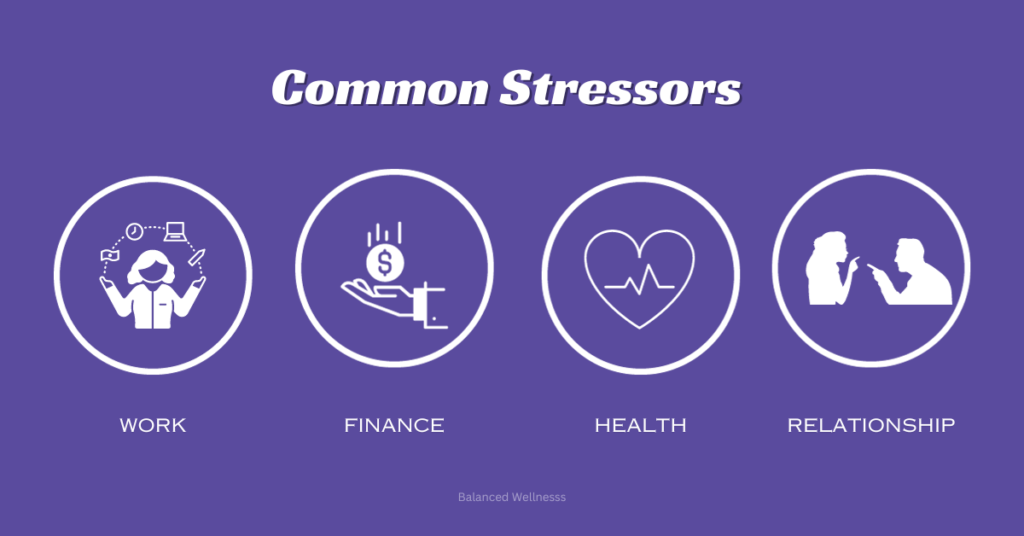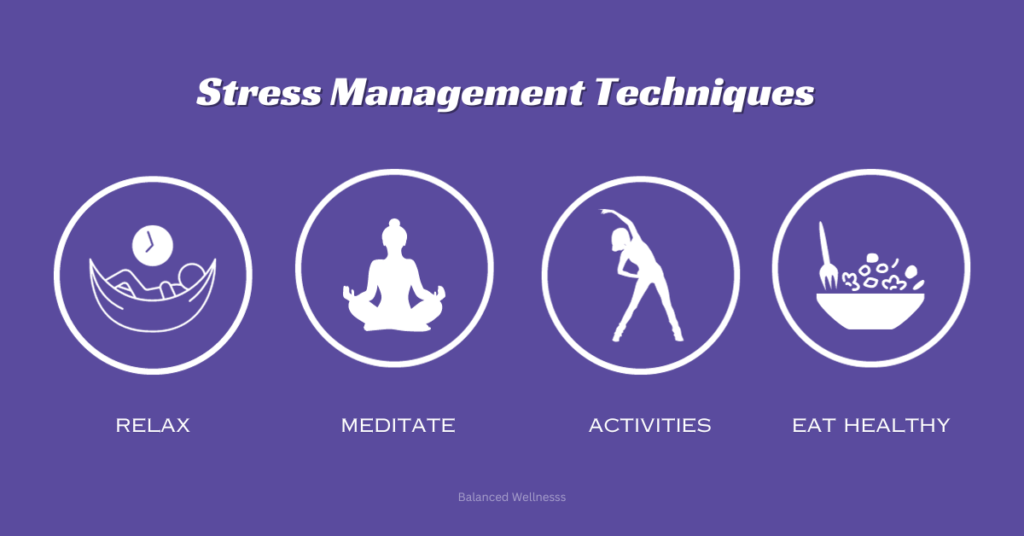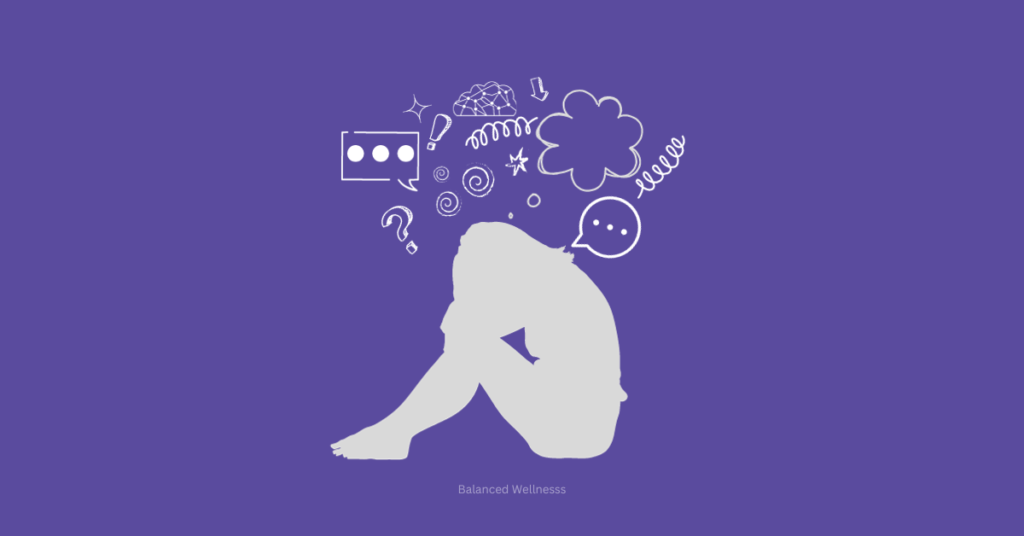What is Stress
Stress can be defined as a state of being worried or feeling tense due to a particular situation. It is how we react when under pressure or threatened. It is a normal response that prompts individuals to address everyday challenges or difficult situations in life personally and professionally.
We all experience different stress levels at some point or in day-to-day activities. But how we respond in a stressful situation makes a big difference.
Minor to medium stress levels may lead to short-term and long-term health consequences if not managed on time. Therefore, it is important to understand what is stress, to have a strong grip on this subject, its various types, and the effects of stress on physical and mental health.
If you are experiencing continuous feelings of stress, then this blog post will be your roadmap to minimizing everyday stress that leads to mental resilience and improves overall well-being.
Importance of Understanding What is Stress?
We live in this fast-paced world, where stress feels like a synonym to life. Be it a daily commute, getting an extra deadline at work, or a sudden family emergency. These mentally challenging situations can make you feel stressed from being chilled out in split seconds.
Like most aspects of mental health, your stress levels and how you handle it depend on several factors, including genes, environment, and physical and psychological issues. These stressors can cause people to respond in different ways.
Therefore, it is important to understand this little overwhelming but breathtaking feeling everyone experiences.
The Physiology of Stress – Stress Hormones
Your body is made to react to stress in a way to helps you protect from dangerous situations or other aggressors. When you sense danger or threat, a tiny region at the brain’s base, known as the hypothalamus, reacts. It then sends nerve and hormone signals to your adrenal glands, which release many hormones.
These hormones help you prepare to face danger naturally and increase your chances of survival.
One such hormone is adrenaline or the fight or flight hormone. What adrenaline does:
- Increases your heartbeat
- Increases your breathing rate
- Helps muscles use glucose easily
- Helps blood flow through the muscles
- Inhibits insulin production
On the contrary, too much adrenaline in the body:
- Damages blood vessels
- Increases hypertension
- Increases the risk of heart attack
- Results in headaches
- Causes insomnia
- Leads to gain weight
While adrenaline is important, it is not a primary stress hormone. It is cortisol. Let’s dive deep into it.
Cortisol – The Main Stress Hormone
Cortisol, the key stress hormone, is a steroid hormone. Adrenal glands produce it that are present above the kidney in your body. It is essential to have the right cortisol balance in your body because producing too much or too little cortisol can result in numerous health issues.
When you feel stressed, excessive cortisol is released into the blood.
Cortisol performs various functions in the body. Among these many functions, the important ones include:
- Raises the body’s metabolism of glucose
- Helps the brain utilize glucose effectively
- Controls the blood pressure
- Reduces inflammation
- Responds to stress or danger
Putting it simply, cortisol is essential for human survival and is needed for the fight or flight response. It is known to be a healthy and natural response to threat or danger.
However, it is also important to understand that high cortisol levels for too long can negatively impact the body.
The adverse effects may include:
- Weight gain
- Sleep problems
- Low energy
- Diabetes
- Osteoporosis
- Memory problems
- Weak immune system
You can also experience mood swings that can cause negative health effects. Therefore, it is important to understand the science behind, what is stress to better cope with it.
What are Some Common Signs of Stress
Stress can affect your emotions, body, or the way you behave. Depending on the situation, you may feel stressed in numerous ways, sometimes making it easy to recognize. But in most cases, you may be unable to identify whether you are feeling stressed.
Therefore, it is important to know the signs of stress and the common symptoms of it.
Common signs of stress may include feeling:
- Angry
- Overwhelmed
- Uninterested in the things you like
- Dread
- Worried
- Lonely
- Exhausted
Besides this, some physical stress symptoms may include:
- Body aches
- Headache
- Increase heartbeat
- Chest pain
- Difficulty sleeping
- Difficulty breathing
- Dizziness
- High blood pressure
- Constipation or diarrhea
- Immediate weight gain or loss
- Changes in your menstrual cycle
- Digestive issues
- Weak immunity
Emotional symptoms may include:
- Anxiety
- Depressions
- Sadness
- Panic attacks
Common Causes of Stress
Besides figuring out the signs of stress, it is also important to know the root cause of the problem or, putting it simply, what are the common causes of stress you are experiencing daily.
Whether it’s a big occasion in your life or small changes that you are not used to and not ready to adapt to yet, it can cause stress.
Types of Stress
Not all stress is bad or harmful to health. Experiencing minor stress is normal; however, if you feel more than usual about it, you need to understand the different types of stress and how to deal with them.

Type 1: Acute Stress
As the name represents, acute stress is short-term stress. It often feels like a short-lived spark of tension in everyday life that vanishes once the stressful situation is over.
Some common examples include being stuck in a traffic jam, the pressure of giving a public presentation, or experiencing a looming deadline.
Besides acute stress making you uncomfortable, it is often manageable and easy to overcome once resolved.
Management Tips
A few tips that can help you manage acute stress are practicing deep breathing, Tai Chi yoga, meditation, or spending time in nature.
Besides this, taking some time out to take a calming bath, listening to music, or watching your favorite show can also be helpful when it comes to managing acute stress.
Type 2: Chronic Stress
Chronic stress is a slow-burning but persistent type of stress that can last for extended periods and seems inescapable.
Examples of chronic stress include demanding jobs, financial issues, and bad marriage. Traumatic stress or childhood trauma can also be one of the many reasons for never-ending chronic stress.
Management Tips
A few chronic stress management tips include regular exercise, eating a healthy and well-balanced diet, getting enough sleep, or making time for leisure activities. Besides this, it is also recommended to set realistic goals that can be easily achievable, and learning to manage your time effectively is also helpful. Practicing mindfulness meditation is also effective in retaining focus.
Type 3: Episodic Acute Stress
Likewise, acute stress, episodic acute stress can result from short-term everyday stressors that can result in unpleasant conditions. However, the key difference between the two is that episodic acute stress is a pattern of experiencing acute stress frequently.
This type of stress can often occur due to multiple stressors occurring altogether or one after another. Episodic acute stress may last longer than acute stress, usually for weeks, months, or even years.
When talking about the causes of episodic acute stress, both external and internal factors play their part. The external factors could be a job interview, a relationship problem, sudden bad news, losing a loved one, etc. Internal factors could be a traumatic past, mental health condition, or panic attack.
Management Tips
All these factors require different management tips, such as small lifestyle changes that you make every day may help relieve stress. Besides these relaxation techniques, cognitive behavioral therapy (CBT) or medication are also effective stress management techniques.
Type 4: Eustress
As explained earlier, not all stress is detrimental. Some types of stress may boost excitement or motivate you to move forward with everyday challenges. And that’s where Eustress comes in; it is the positive side of the stress spectrum. Eustress accompanies excitement, personal growth, and motivation. Numerous factors can cause Eustress:
- Starting a new job
- Learning something new
- Setting up or achieving goals
- Competing with someone
- Taking on challenges
- Experiencing something exciting
Eustress is often seen as an opportunity for personal growth or self-improvement.
Although the symptoms of Eustress are similar to those of the other types of stress, they are often milder or short-lived.
And includes:
- Increased energy
- Increased concentration
- Improved focus
- Feeling challenged
- Feeling a sense of purpose in life
Management Tips
Although Eustress is not too harmful, it is important to manage it properly to avoid being distressed.
To do so, it is recommended to:
- Set realistic and achievable goals
- Schedule regular breaks throughout your day to relax the mind
- Maintain work-life balance
- Incorporate mind-relaxing techniques into your routine like yoga, meditation, or breathing exercises
- Seek support from a friend or family or try talking to a therapist if needed
It is important to keep in mind if Eustress is starting to have a negative impact on your life, it may lead to various issues like anxiety, insomnia, or other health problems. Therefore, it is crucial to learn effective ways to manage stress before it starts taking over your life.
Common Stressors
Now that you have learned a lot about what is stress, its signs, causes, symptoms, and signs. It is also important to have a good understanding of some common stressors that might be hurting you. They are the external factors or certain situations that may trigger stress. Therefore, it is crucial to identify them.
Let’s dive deep into each of them.

1. Work
Worker-related stress is one of the prevalent forms and a significant reason for stress in today’s world that most of us experience. It is seen that 83% of individuals suffer from work stress, while 25% claim their job to be a top stressor in their lives. It is often due to highly demanding jobs or work pressures that can put unwanted stress on people. When not taken care of, it can result in absenteeism, causing billions of dollars to businesses.
Besides pressure or highly demanding work, other causes of work-related stress may include job insecurity, workload, unrealistic expectations to do the job, a conflict with a colleague, or long-hour commutes.
And so, it is essential to identify whether or not you are experiencing work stress. Some common symptoms are:
- Extreme tiredness
- Anxiety
- Job burnout
- Poor concentration
- Physical illness
2. Financial
Financial stressors result from monetary issues that include income, debt, or financial insecurity.
Relationship. Common causes include unexpected expenses, sudden financial emergencies, fear of losing an income stream, unrealistic financial goals, or loans.
3. Health
Talking about health stressors, one may be experiencing this if he/she is constantly worried about their physical or mental well-being. Being anxious about it can affect an individual’s overall quality of life.
Some main causes can be having a chronic ailment, undergoing medical treatments or surgeries, or a severe health diagnosis.
It may lead to anxiety, depression, isolation, or losing the hope and willpower to recover.
4. Environmental
Whether you think about it or not, environmental factors are also one of the key stressors. someone may experience. The possible reasons could be natural disasters, climate changes, or global crises like pandemics, which can create stressful surroundings.
5. Relationships
NOT giving relationship ADVICE here, but relationship stress is real. It may arise due to difficult situations in romantic relations, friendships, or families. Relationship stress can have a significant impact on a person’s physical, mental, and emotional health.
The root causes that may result in stressful conditions are miscommunication, misunderstandings, conflicts, trust issues, or lack of support. It can lead to anxiety, depression, irritability, or physical health issues.
Psychological Effects of Stress
While we talk about stress a lot, it is important to understand that stress not only impacts physical health but has the potential to cause psychological effects too. Three common psychological issues or changes include:
1. Cognitive
Talking about the cognitive impact of stress. It can be challenging for people dealing with it. Continuous stress may lead to poor concentration, you are unable to focus on your work, not even on one task at a time, or are unable to think clearly.
Besides this, stress can impact your memory too. You may struggle to recall the past events or the most memorable moments of your life.
Unwanted stress can also lead to negative thoughts and emotions. When you are constantly stressed out, there is a higher chance you experience a pattern of negative thoughts or excessive worry.
2. Emotional
Emotional effects of stress include anxiety, depression, and feeling angry or overwhelmed. Anxiety is the number one emotional factor one dealing with stress may have to deal with. You may feel nervous or constantly worried about the uncertainties in life or of your future.
Prolonged stress can also cause depression leading to hopelessness or sadness. You may also feel angry or frustrated all the time if you are stressed for a long period.
3. Behavioral
Stress surely impacts your mood and behavior too. The behavioral effects may include a significant change in eating habits that leads to overeating, undereating, or not eating at all.
Sleep disturbance is also another common behavioral change you may experience when stressed.
Besides this, procrastination avoiding important tasks, and isolating yourself from family, friends, or activities are also common behavior changes.
Physical Effects of Stress
Besides having psychological effects of stress, it may also lead to physical health issues as well. Some of them include muscle tension, particularly neck, shoulder, and back pain.
Stress can also result in digestive issues or a weakened immune system. Cardiovascular issues, respiratory problems, and skin issues are all too common physical effects of stress.
Coping Strategies
Now that you have learned quite a lot about stress, you might be wondering what could be possible stress-coping strategies to manage or minimize it.
And so, some of the effective strategies to cope with it include:
Stress Management Techniques
Although there are several ways to cope with stress, making some small lifestyle changes can help you manage stress without any medication or treatment. These are:

(i) Relaxation Exercises
Breathing exercises or muscle relaxation are some of the common yet effective relaxation tips to manage stress levels or calm your body.
(ii) Meditation
Meditation when done right proves to be very effective in dealing with stress responses. Regular meditation enhances your ability to manage stress while giving your brain clarity to keep it calm. Besides this other mindfulness practices help you be more present and make thoughtful decisions.
(iii) Physical Activities
Being physically active is a sure way to reduce and manage everyday stress. Exercising regularly may help release hormones called endorphins which are considered natural mood lifters leading to a positive impact on both physical and emotional wellness.
(iv) Eating Habits
Making changes to your diet may also improve your mental health. A well-balanced and nutritious diet is an effective way to cope with stress. When you are feeling stressed more than usual, try limiting your caffeine or sugar intake. Avoiding processed food items and incorporating more fruits and vegetables into your diet may also help relieve stress.
(v) Sleeping Habits
Quality and restful sleep is also one effective way to minimize stress. Therefore, it is important for you to have a regular sleep schedule to get a comfortable 6 to 8 hours of sleep that eventually improves your quality of life.
Seeking Support
When the above-mentioned natural remedies don’t seem to work. Trying to seek professional help or support is not a bad idea at all.
Oftentimes times we feel overwhelmed by the idea of talking about our mental health to someone. But there is nothing wrong with it. Therapists or counselors offer the best guidance to deal with stress when you are unable to treat it naturally. Besides this, sharing your thoughts with a close family member or friend may also help get through it.
Bottom Line
Summing it all up, not all the stress is bad all the time, yet you have to be mindful of how you are feeling about it. Therefore, it is important for you to understand what is stress, its various types how to treat it naturally, and when to ask for help.

